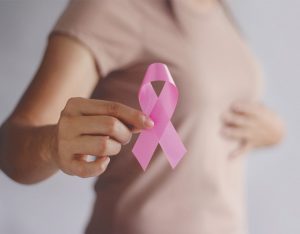 Identifying any type of cancer at an early stage, before it has spread extensively (metastasis), provides a much better outcome for patients.
Identifying any type of cancer at an early stage, before it has spread extensively (metastasis), provides a much better outcome for patients.
That is certainly the case when it comes to breast cancer. The earlier cancer is detected, the easier it is to treat – and patients likely will have a more positive prognosis. In its earliest stages, where the cancer is localized and has not spread outside of the breast, the 5-year relative survival rate is 99%, according to the American Cancer Society. Sixty-one percent (61%) of cases are diagnosed at this stage.
Florida Cancer Specialists’ physicians concur with the American Cancer Society’s recommendation that women over 40, with no family history of breast cancer, should get a mammogram once a year; for women under 40, a clinical breast exam is recommended at least once every three years. In addition, monthly breast self-examinations can be an effective way of discovering any changes in the normal look and feel of the breasts. Since 2007, breast cancer death rates have continued to decrease in women older than 50; rates have remained steady for women under 50. Researchers believe these decreases are the result of several factors, including increased awareness, better screening technologies and improvements in treatments.
Know Your Risk Factors for Breast Cancer
Regardless of age, race, or family history, all women – and about 1% of men – have some level of risk for breast cancer. Primary risk factors include age and gender, along with a number of other factors, such as obesity and alcohol use, which can be moderated through healthy lifestyle choices, awareness, finding breast cancer earlier through better screening technologies and improved treatments. The risk of breast cancer nearly doubles if a woman has a first-degree relative (mother, sister, daughter) who has been diagnosed with breast cancer. This is one reason why you should discuss genetic testing with your doctor, if you have a family history of breast cancer.
Impact of COVID-19 on Breast Cancer Screenings
Breast cancer is one of the few types of cancer for which there is an effective screening (mammography); however, during the coronavirus crisis, many women have wondered if it is safe to go to certain medical appointments, including getting scheduled mammograms. Screening mammograms – at every age – are one of the best ways to diagnose breast cancer early, when it’s most treatable. Women will need to make an informed decision with their physician as to whether or not to get a mammogram during COVID-19.
Remember – even if you are diagnosed with breast cancer, it does not necessarily increase your risk of having more serious complications if you do get COVID-19; however, for people in active treatment for breast or any type of cancer, there may be a higher risk for serious complications from COVID-19 if their treatments cause them to become immunocompromised (have a weakened immune system) or have lung problems.
Screening Guidelines for Women 55 to 75
The American Cancer Society (ACS) screening guidelines recommend that women ages 55 to 75 at average risk of breast cancer, with no family history, can be screened every one to two years. If you are between 55 and 75 and had a normal mammogram within the past year, you could choose to have your next mammogram up to 24 months after your last one, so that you don’t have to be screened during the pandemic.
Are Mammograms Necessary for Women Over 75?
Considering that older people have a higher risk for COVID-19, some are questioning whether mammograms are even necessary after the age of 75 for women with no family history of breast cancer, and a record of normal mammograms. The ACS recommends, “Women should continue screening mammography as long as their overall health is good and they have a life expectancy of 10 years or longer.”
One study, cited by BreastCancer.org, confirmed the benefits of regular mammograms and emphasized that there is no upper age limit for mammograms. Again, every woman should discuss with their physician whether or not to get a mammogram during COVID-19.
Florida Cancer Specialists treats patients with all types of cancer, and offers a number of services, such as an in-house specialty pharmacy, an in-house pathology lab and financial counselors at every location, which deliver the most advanced and personalized care in your local community.
Florida Cancer Specialists
North Port
3085 Bobcat Village Center Road
North Port, Florida 34288
Port Charlotte
22395 Edgewater Drive
Port Charlotte, FL 33980
Venice Island
901 South Tamiami Trail
Venice, FL 34285
Venice Healthpark
836 Sunset Lake Blvd,
Suite 101
Venice, FL 34292
Englewood
714 Doctors Drive
Englewood, FL 34223-3992
For more information, visit FLCancer.com









